Stellan Skarsgård comes down to the lobby restaurant of the Ritz-Carlton on Central Park a few minutes late on account of his son Gustaf, who called after seeing his father in Joachim Trier’s latest movie, Sentimental Value. “I know exactly what this is about. Do you recognize yourself?” Stellan-as-Gustaf recalls. “Yeah, yeah. I know,” he groused back. In the film, the patriarch of the Skarsgård acting clan (seven of his eight children, including Alexander, Bill, and Gustaf, have gone into the business) plays Gustav Borg, a director in the winter of his life trying to connect with his daughter (Renate Reinsve) by offering her the lead role in his new movie. Sentimental Value could earn him the first Oscar nomination of his six-decade career, which runs from the bleak melodramas of Lars von Trier to Hollywood franchises like Thor, Mamma Mia!, and Pirates of the Caribbean. There’s a subtle charm that hums whenever he’s onscreen: Dad’s having fun. He remains undiminished, even after he suffered a stroke three years ago, before he was set to shoot the second season of Andor and Dune: Part Two. “I feel a little more like I live under the sword now,” he says. “Because I’ve lived a naughty life. And I’m 74, which is already on overtime.”
Stellan Skarsgård: Have you seen the film?
I wouldn’t take the assignment without seeing the film. I would’ve said yes to talking with you regardless of the project, but it helps when the movie is good.
It’s much easier to do publicity for a film that you like.
How is it promoting a film you don’t like?
I mean, you have in the contract that you have to promote them. And so I tell the producer, “Okay, I’ll promote it, but I cannot lie.” I tell them it’s a horrible movie and they get so scared, they know not to allow me near a journalist.
In Sentimental Value, you play an acclaimed director working on what could possibly be one of his last films. He’s trying to do it with one of his daughters with whom he has a strained relationship. Where were you in your life that intersected with this film?
All my career, it’s been mostly chance. But I usually take the projects I like if I can. If they have a good director or if it is a failed brilliant film — there’s something interesting about it. With Joachim Trier, I was waiting for him to call. It was about time, I thought.
Did you tell him that?
I told him later. I played hard to get for a week. We had lunch together and talked about the film. He wanted to pay for lunch. I said, “No, no. I don’t want to be in debt to you.” So I paid. And that was a weak way of saying I’m independent; I’m not easily flirted with — which I was. It’s one of the best roles I’ve ever had, and he’s one of the best directors I’ve worked with. So of course I would’ve said “yes.”
Why were you being so coy?
So I wouldn’t jump up and down and say “This could be something!” and jinx it. He’s a very good director, but he could still fuck it up. I don’t get that enthusiastic over things. I get enthusiastic over a good meal, but I don’t get enthusiastic over getting a good role. Every job I say “yes” to, I go, Oh, no, and I see this mountain of work and anxiety and fear of failure.
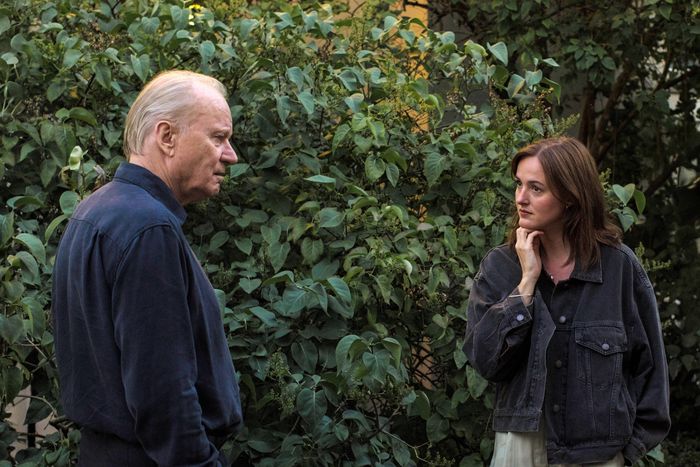
With Renate Reinsve in Sentimental Value. Photo: Kasper Tuxen/Neon/Courtesy Everett Collection
Having worked with so many directors throughout your career, what did you need to know about Gustav to build him out as a character?
At first I thought, “Ah, who should I copy and who should I have my revenge on now?” But I wanted to know what kind of filmmaker he was. I had this vision of a Polish or Czech director from the ’60s — very visual and dark. That gave me a lot of joy, so I started with that. Because in the script, he’s not fully developed. So you have to balance him, especially when he is stupid and doing the most horrible things. You have to make him likable so people understand his motivations, that he does it out of love in a way. Because he doesn’t have the tools to handle his relationship with his daughter.
It’s hard to talk about acting because there’s so much I don’t know. And the best things that create life are usually inexplicable, and you don’t know where they come from.
Is there a danger in knowing too much or trying to know?
I don’t create a backstory because backstory is a restriction. A person is so complicated. You’ve already reduced him by filling in a backstory. Some actors say, “No, my character wouldn’t do that.” My answer to that is “How do you know?” You close the door to spontaneity. And that is really dangerous because you’re killing the thing that is cinema.
You have eight kids. Were you personally working anything out as a parent with the film?
I didn’t intend to, but especially when I see the film, I go, Ooh, yeah. I could have been there. That could have been done. Alexander saw the film at Telluride, and he came out, destroyed in his face, and he hugged me.
The film is about how artists can be quite narcissistic and focused on work to the detriment of their relationships.
Your work is you to such a big extent. It’s not like being an accountant. If you’re a painter, if you’re a musician, you go to work with you and your own material. Combining that with family life is hard. But if you become a really good father and you are at home more than you want to be, then suddenly you reduce yourself.
Because you’ve been reduced to “Father”?
No, because you’ve become some other person. It’s like you would think differently. You would act differently. You need your creative art. It’s your stimuli. And you are more fun to the kids when you come home and tell them a story that you can’t tell them if you haven’t been stimulated. I’m trying to defend myself now. But I have a very good relationship with my kids. I wouldn’t have spent 50 years with them otherwise. But they have no respect for me just because I’m their father. Because that’s bullshit. You shouldn’t be respected for five minutes of joy.
Just five?
[Laughs.] Well, I was sleepier. They don’t have to put me on a pedestal or anything.
It sounds like you don’t demand respect just because you’re their father.
No, I don’t demand respect for being a father. I demand respect for a good idea or if I do something well or if I create something for them. When my son Alexander was on Conan, he was talking about his childhood and he said that I always walked around naked, and Conan said, “Even when he cooked? Isn’t that dangerous?” “No, no, no. It’s this small,” Alexander said. And that lack of respect is very good. He can joke about anything.
What was your relationship with your own father like?
I loved my father very much. He was very intelligent. He was quite flawed and very human. He had his first stroke when he was 70, and he ended up in a wheelchair. He had problems talking, and when he was irritated, he would shout my mother’s name at her: “Gudrun!” And we said, “Don’t scream.” We had conflicts about that, but I didn’t love him less for that. He had a second stroke and was on his deathbed. I sat and held his head in my lap. I had my other siblings around me. He died and I started crying. And his mouth was open. So I closed his mouth. Then I opened it again. And then I closed it again. I looked at my sister and I went, “Gudrun!” And we started crying again. But everybody laughed in the room, and my father would’ve laughed too. That is what I mean about no unnecessary respect. He would have loved it, but it’s not what you’re supposed to do with a corpse.
So much of Sentimental Value is about directing style. When Gustav is working with an American actress, Rachel (Elle Fanning), every time she has a question for him, he replies, “Well, what do you think?” Do you have a preferred style?
There’s some preference. I like Lars von Trier and Joachim Trier because neither forces the solution on me. It’s enough that they force their idea. But they don’t block the scene necessarily. They just say, “If you want to walk the other way, try something.” They have the camera following instead. They don’t say, “Could you please say, ‘I love him! I love him!’ ” [His voice trills upward on “love.” ] So I like them very much. But directors don’t talk to me much about how to do it, because I know better than they do. They can tell me “faster” or “slower.” But bringing a character to life, you’ve got to be free. That’s the kind of director I like.
I worked with Miloš Forman on Goya’s Ghosts. Natalie Portman had a question for him, and he said, “Why? I cast you! It’s your job. Where are we eating tonight?” That was his response. And that is true.
My introduction to you was Breaking the Waves, which I first saw when I was in high school, and it …
Destroyed you forever. [Laughs.] When I read the script, I said, Yes, finally a love story I can relate to. Because it is about love. It is not about if you’re going to get into bed with a girl or if you’re going to get married to the girl. She does everything out of love. And he loves her, and he tells her to go out and fuck somebody else because he thinks that she will leave him because he’s paralyzed. She has no future with him, but she doesn’t leave him. She fucks other men and comes back and tells him. So tragic. I went down to Copenhagen to meet Lars, and he had already offered the part to an actress.
Helena Bonham Carter.
Yeah. So Helena was also there. We came up to his house, he opens the door, and he reads my body language. He said, “Don’t hug me. I don’t like physical contact.” So I hugged him, of course. And he was wriggling and trying to get away. Then he calmed down and I let go. But we’ve been hugging since.
He would have been thinking about his manifesto Dogme 95 around this time, which sort of trollishly lays out a system of principles to save cinema. Did you have conversations about the filmmaking process and his philosophy?
We could have talked about the filmmaking and the theory behind it, but we didn’t. He was very hands-on, and he was friendly. Helena was rather tired. She had an early flight. She was half-lying on the sofa. She hadn’t said “yes” yet. We’re sitting in the car to the airport, and I said to her, “You’re an idiot if you don’t take it.”
Did you sense hesitation from her?
Yeah. Of course, it was an unknown director at the time. A strange Danish guy and a strange Swede involved too. And those two guys had a film about fucking, basically, with a lot of nudity in it, so it didn’t fit the British psyche. There were probably a thousand reasons for her. Maybe she didn’t like it. She didn’t take it. Later, I saw her at an Oscars party 50 meters away, and I said [mouths “See?”]. “Yes, I know, I know, I know!” she said.
You became famous at an early age with the TV show Bombi Bitt och Jag (Bombi Bitt and Me), playing a character you’ve likened to a Swedish Huckleberry Finn. What did sudden fame do to your psyche? You could have continued chasing fame, but that wasn’t really the path you went down.
I was 16 when I did it. Everybody saw it. The girls were crazy about me, and I loved it. But I knew there was a distance between who I was and what my official appearance was. So I did not believe the papers myself.
You knew that then.
Yeah. I had help from my parents and my siblings, who said, “Oh, no, you’re not that guy.” So they were very wise. But it’s another thing being a big movie star in Sweden. You can’t support a family being a child star in Sweden. I think I got about 7,500 krona for the entire series. So there’s no financial incentive for you to be fucked up. You can’t even afford drugs.
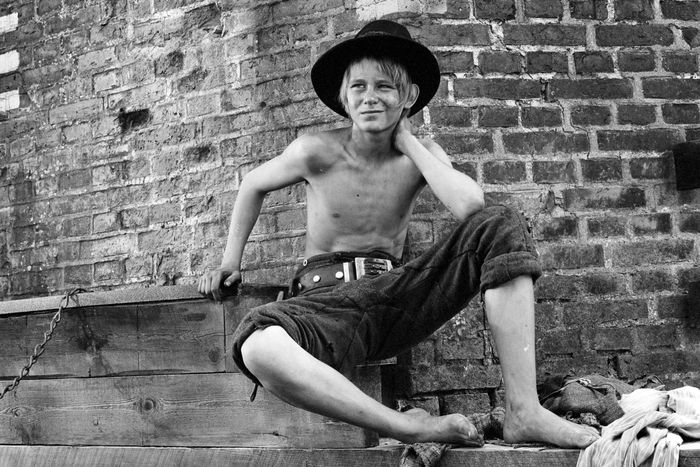
1968: Bombi Bitt och Jag. Photo: Pan Vision
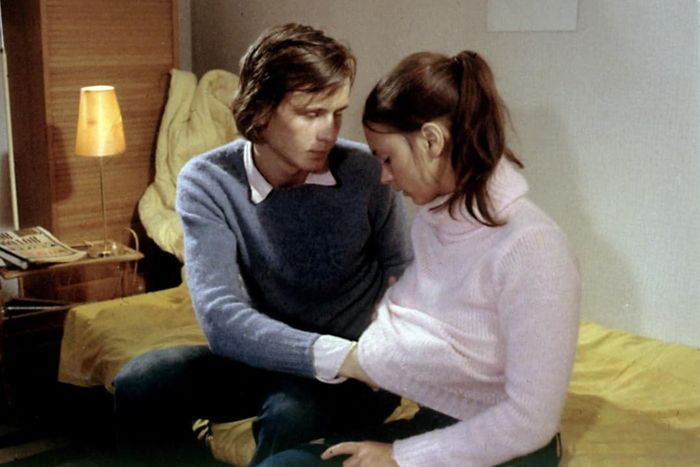
1973: Anita: Swedish Nymphet. Photo: Cambist Films
For the bulk of your 20s and well into your 30s, you were part of the Royal Dramatic Theatre in Stockholm. Why did you decide to go there for much of your early career?
Well, it wasn’t a decision. I’ve done amateur theater, and we had a theater group for a while where we did everything together before the TV show. Afterward, I got theater offers, and that made me quit school at the age of 17. I did small roles for years, but I was never unemployed. And then I started doing film. My first film was this sex comedy called Strandhugg i somras [Raid in the Summer] in 1972. They ran out of money during the shoot. I still haven’t got paid for it.
I did a couple of soft-porn films. The first one, Anita: Swedish Nymphet, I thought, Oh, this is about a nymphomaniac, her psychological problems. Okay, interesting. And I did it. And I saw that it misses the point. But it doesn’t miss the point of her being a nymphomaniac.
Then I did another one with open eyes. I saw that they were sexploitation films, so I had no illusions anymore. Then I became afraid of the camera. I got camera fright because I made such bad films. So I didn’t do films for five years or something. It’s like stage fright: It feels like your head is about to explode and you cannot remember what you’re supposed to say. And if you remember something, it comes out with a voice like this [does a thin, constipated voice] because you’re so tense and scared and you want to die. That’s how bad it is.
How did you overcome that?
By doing a student film with some really good friends and actors. I found my way back to relaxation. Right after that, I did The Simple-Minded Murderer. I won the prize in Berlin. I met an agent called Jeri Scott in New York, and she wanted to be my agent. It took her five years to get me to come to L.A. But she got me for The Hunt for Red October. They offered me that role. I worked for a day and a half and got more money than I made before in my life.
How much was that then?
Probably about $50,000. It was a great check and residuals, everything. So suddenly I thought, It’s a good idea. This works for me.
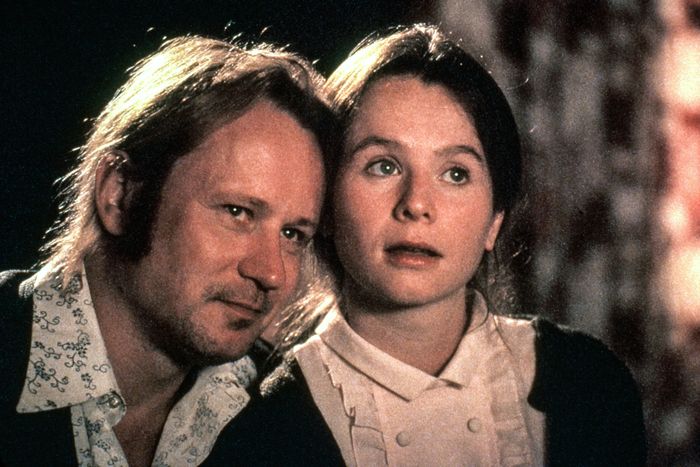
1996: Breaking the Waves. Photo: Miramax/Courtesy Everett Collection
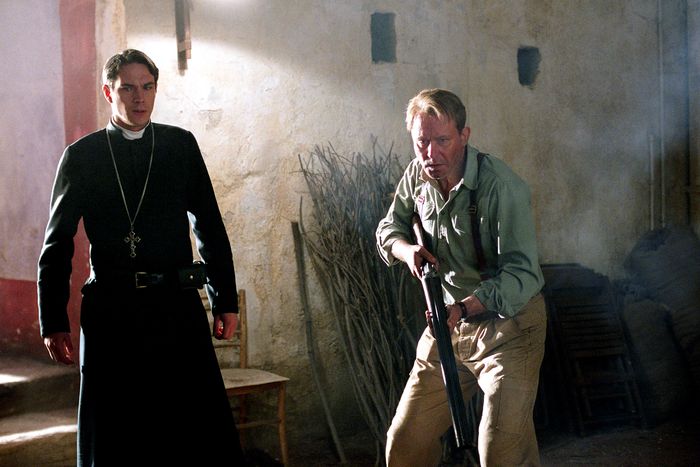
2004: Exorcist: The Beginning. Photo: Warner Brothers/Courtesy Everett Collection
Starting with Breaking the Waves in 1996, you’ve made six films with Lars von Trier. Why has that relationship worked for so many years?
We love each other with an acceptance of our differences, which is a condition for all kinds of love. He’s very smart; he’s funny; he’s vulnerable. You feel safe on his sets. On Breaking the Waves, he had a big sign saying MAKE MISTAKES. He would say, “You haven’t made any mistake?” “No, I can. It’s coming.” In some ways, he’s freer than most people and freer in thought. He said to me, “Well, Stellan, I found out finally what kind of films I make.”
“Yes, Lars, what kind of films do you make?”
“I make the film that hasn’t been made.”
“Exactly, Lars. That’s what you do.”
And people, especially in America, think that he’s a demon, a monster that is wringing this painful thing out of the actors. They have strange ideas about the process: The making of a film has to be painful; you have to work for two years as a murderer to become a murderer. Something like that. But he’s lovely. He’s got Parkinson’s now. I don’t know what’s going to happen.
I had read some rumors that you were supposed to shoot a film with him this summer called After about his Parkinson’s. Is that true?
Well, he hasn’t told me about it. He had an idea of doing a film like … Do you know the old French film La Jetée? La Jetée is a film built on black-and-white stills. It’s beautiful. And that one he could do at home. That’s what he’s been talking about. I’d do it. I’d say yes to him — whatever he asks.
Even if he made a film where you thought the script was bad, would you still do it?
Yeah, because it probably should be made because it hasn’t been made.
You worked one day on the Dancer in the Dark set. My understanding is there was considerable conflict between Lars and Björk, and I’m curious what it looked like from your vantage point.
I was in my summer house and suddenly the phone rings: “Hi, it’s Lars.”
“Hey, Lars, how’s it going?”
“She’s absolutely crazy now. She tore her T-shirt into pieces, and we had only one. And then she ate it and then she climbed a six-meter-high fence and disappeared. And she’s not coming back.”
“Wow. Congratulations. You have full hands, I see.”
They had to shut down for a couple of days. When I came to the set to do my half-day of work, I started walking across a lawn of the studio, and a car comes fast and brakes, and the door flies open and Vibeke Windeløv, who’s the producer, runs up to me and she says [makes sobbing sounds]. I knew it wasn’t all right.
What did she say was happening?
Lars called another time. He said, “Now, I think I found the problem, the root, the method to fix it. In her trailer, I took the big television set that is there, and I smashed it. And then she was quiet.” The thing is, all her career, Björk has been designing everything. She’s a control freak. And she meets Lars von Trier, and you don’t tell Lars von Trier to make a different film. And, of course, Björk was also afraid of getting the big role and being brilliant. She was brilliant.
What does the process need to be?
Like Joachim Trier or Lars in general — friendly, with trust, but he is the director. It’s like a conductor: You can argue with him, but you’ve got to leave him and let him decide. Some people think, Well, we’ve got to have conflict on the set because otherwise it would be boring and shit. I don’t believe you have to suffer to create art. You suffer anyway.
I assume you react badly to manipulation by a director.
I react very badly to manipulation. I don’t like to be manipulated, especially since I don’t think that any director knows more about how to get me to do things than I do.
You said Ingmar Bergman was manipulative. Was he difficult to work with?
He was not manipulative as a director, but he was a manipulative man in life. He executed his power through remote control. He made sure that the right people got the right jobs and that the wrong people got fired. That people’s careers either flourished or vanished. It was a manipulation in that sense. His way of directing you was very concrete. He was not a manipulator in terms of trying to get you to a certain point. He was a good director.
Click here to preview your posts with PRO themes ››
You’ve said that you know a director is bad because they’ll cut away from you when you’re not speaking.
It is like storytelling from television, where everything’s in lines and nothing is left for the actors to do. Film lures. Television is written so that you have all the information on the page. It doesn’t matter who directs it; it doesn’t matter who acts in it. It doesn’t even matter if you look at it, because you can do the dishes at the same time and follow it.
Do you feel that way about the television shows you’ve done?
No. I did Chernobyl, and Craig Mazin and Johan Renck did all of the episodes. HBO at its best — the grand finale, in a way, for HBO. Then on Andor, the creator, Tony Gilroy, called me. First of all, I said, “Star Wars?” He said, “It’s a more complex version of Star Wars. We’re going to create real people living in real worlds.” And he did that. My concern was that I didn’t want to sign up for seven years. So I asked him, “Will you be showrunning and writing all those seven years?” He was trying to evade the answer, but he’s an honest man and said, “I can’t promise that, but I can promise two years.” I said, “Would you promise to kill me after two seasons if I want?” “Yeah, I promise to do that.” I could have done another season. I wasn’t bored with it.
During this second season, which ended up being the final one, a lot of people felt the massacre in Ghorman resonated with the real world, specifically Gaza. What do you think of people bringing real-world politics into their understanding of the show, and vice versa, even if the show wasn’t informed by that specific conflict?
That’s the way to treat any show: You bring your experience to the table, and together you find something out. This show was written before Trump even won. It was written before the horrors of Gaza. The sad and the good thing is that you can write a show like this anytime. You can be sure that it’ll fit the world.
Last year, you donated a signed Mamma Mia! record for a fundraiser for humanitarian aid to Palestine. Was that a politically fraught decision for you?
No. In Sweden, I protested even before they went into Gaza.
Before October 7?
Right after, when they started talking about flattening Gaza, about sending them to Africa, and other things. The thing was that you knew what was going to happen. Because since 1948, they’ve been doing the same thing. If the Palestinians kill one, they’ll kill ten. Plus they’ll bulldoze the home of the family and friends. We were afraid that they would go in and try to flatten Gaza. One of the Swedish papers had a big article with a picture of me saying that I was supporting antisemitism. The usual. But every night, I think about it. Every night.
Since I had the stroke, my argumentation is much weaker. My language is weaker. I feel that I cannot fight. I can’t have a discussion.
Can you tell me about the stroke and how it’s affected you?
I got really scared.
When did it happen?
Three years ago. Between one and two of Andor and one and two of Dune. That was perfect timing. But I found a way. They have earpieces where you have a prompter that says the line. It’s not enough because I have my rhythm. They have to say their line on top of my line for me to be able to answer it. They have to say it very fast, very neutral. It takes a lot of training for that guy.
Was this on Andor?
No, it was on Dune. You might say, “Oh, you’re lucky. You don’t have to learn your lines.” There’s more work now than there was before. Suddenly, I can’t come up with names. I can’t follow a thought or make an argument that spans several sentences that gets to the point — that, then bang! That is extremely frustrating. But on the other hand, I’m alive. I can work.
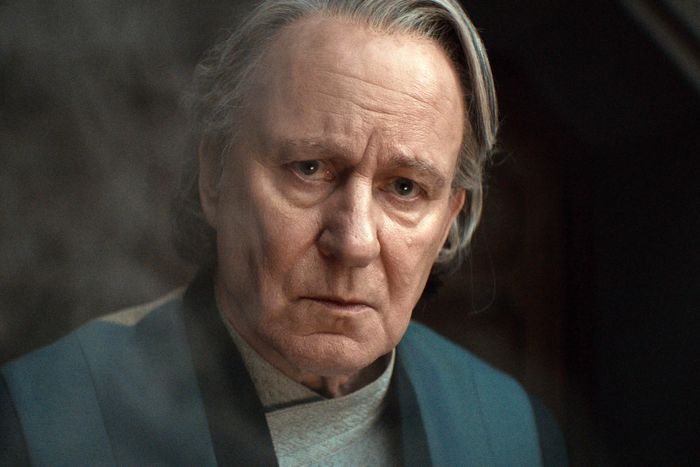
2025: Andor. Photo: Disney+/Lucasfilm /Courtesy Everett Collection
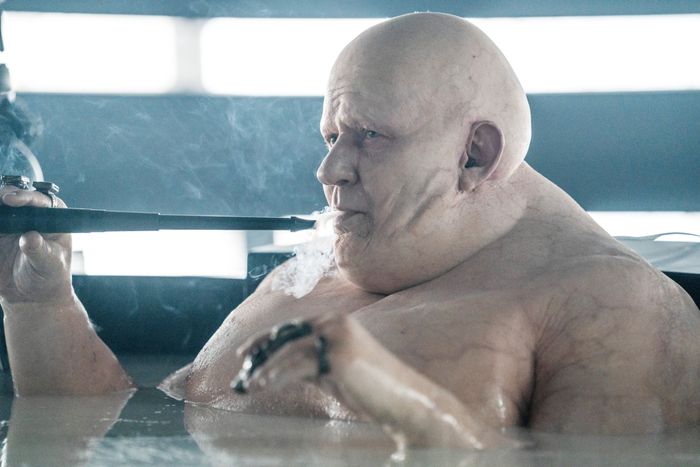
2024: Dune: Part Two. Photo: Niko Tavernise/ Warner Bros./Courtesy Everett Collection
Did you ask yourself any larger existential questions?
Wouldn’t that be lovely? No, I’m afraid I didn’t because I knew I was going to die. It didn’t come as news to me. But, of course, I considered, This might be the end. I didn’t know how bad the stroke would be or if there would be follow-up strokes.
Has it changed how you think of yourself as an actor?
No. This film, I did fine. You’re saying that maybe it has changed me — I have experienced something that has put me in another position as an actor.
Yeah. I can imagine it’s a profound experience.
I’m not afraid of dying, but I am afraid of not being capable of living. That is a fear. And being boring. With all my eight kids, there’s one thing I’ve been afraid of every time I have a new kid. Not that they have Down syndrome or they’re autistic … that they’re boring. Luckily, none of them were.
Many of your kids have become actors. Would you consider them nepo babies?
No. I consider myself a nepo daddy because I get so much goodwill and maybe jobs because of them.
Have you actually gotten a job because of them?
I don’t know. I know that they haven’t recommended me for anything, because I didn’t recommend them for anything. But my 13-year-old, Kolbjörn, the youngest, suffers from that. When his pals at school call him nepo baby, he gets so sad. He doesn’t have any friends at school. He gets isolated. Cruel kids — or cruel and ignorant. They love it on the internet. But it is such a bullshit thing. Because nobody would hire you, at least not for anything good, if you’re not good enough.
Has money been a large consideration in your decision-making?
Not really. We’ve got free schools, free universities. Health care and everything.
You’ve got a good setup. Congrats.
Congrats, yeah. But, of course, when a big studio comes and offers me something, I say “More!” immediately. Because they’ve got to pay. European independent films, I go down in price. I am not interested in money other than spending it. My family eats my money all the time. I am not getting rich in this. But I’ve had a lot of fun. Have you heard about when I took them to Italy, for instance, when I was shooting there?
No, tell me.
I usually bring them with me. You also have to bring your wife’s friends because otherwise she will be alone in a foreign city babysitting. You have to get some of the kids’ friends. They’re a social functioning unit. We had 43 Swedes living in Frescati outside of Rome when I was shooting the first Exorcist movie there. I worked 12 hours a day because I was the lead. I barely saw them. I saw them on the weekends. But the house was vibrating with joy because they were having a party. I made a lot of money on the film, but there wasn’t that much left. It was worth it.
The first one was directed by Paul Schrader, which was quite interesting. But the producer didn’t know that they’ve hired Paul Schrader and doesn’t know that they’ve hired Skarsgård. It came out, and it was a two-hour film about a man in crisis. They wanted a horror film. They reshot it with Renny Harlin and released that one first. But same script, same makeup, same clothes. It was such a weird experience. I filmed once before with Renny Harlin, so I like him. He’s not Paul Schrader level, but he’s a big Finnish child. He loves making films. You appreciate that in a way. We had a lot of fun doing it. But the results, I don’t know.
How important is the end result for you?
For me, the most important thing is the shoot. I love being on set. That’s where the magic happens. I can’t do anything about it after that. There’s so much that is chance. But the good thing about film is that when it comes out, you can choose to forget it. In theater, you have opening night, and if it is a disaster, we have to still play the same shit for another year.
What do you feel is the largest impediment to creating good work right now in this environment?
It’s always fear. It could be political fear because of the current situation where suddenly somebody is punishing you for having the wrong ideas. Or it can be fear of a financial disaster. There is a book by Daniel Kehlmann called The Director about G.W. Pabst. He came over to to Hollywood in the ‘30s. He found it hard for the commercial side of American movie-making to accept what he wanted to do. He was more of a German Expressionist. Then he went back to Germany because his mother was sick, and he wanted to get back to America. He was anti-Nazi.
But the war started, and he got stuck in Germany. The Nazis said, “Mr. Pabst, you’re one of the best directors in the world. Why don’t you work for us?” “But I can’t work with you. I can’t do your propaganda.” “No, no, no, no. You can do whatever you want. For us, it’s enough that you are doing it.” Then he got to do what he wanted. But it is also a victory for them. At the same time, it was what he needed to do to survive mentally and physically. He had bigger freedom in Germany under the Nazis than he had in America. But he couldn’t touch, of course, the political situation. It’s interesting.
What do you think of that? He’s not Leni Riefenstahl.
No, she hadn’t quite dealt with it. That’s terrible, when you see her laugh with the old Nazis together. But it is very complicated. Some of the most wonderful films were made in the ‘60s in the Soviet Union. At the same time, financial pressure leads to financial censorship. Art has to have permission to be. It has to be unregulated. It has to be as wild as it ever can be.
How do you feel about the sociopolitical arena you’re entering with an awards campaign like the Oscars?
The Oscars have their place. They are good for the business, and they’re good for independent films because there are many films that wouldn’t be seen at all if it wasn’t for the Oscars. Is it fair? You can’t compete in any art, so it’s a silly concept, but it is a lot of people voting on what they think is the best of the films they’ve seen. I do it myself every year. The thing is that it costs a lot of money to participate in that race. And fortunately we have American distributors that are paying for it because no European film company could afford it.
You look at Neon, for instance. It’s a really good company. They are enthusiastic, and they know the market. They invest in the fucking Oscars. The modern Oscar campaign was originally a Harvey Weinstein invention in a way. He did a lot of good for independent films too. And some harm. He bought up ten films, then he shelved nine and put one up for an Oscar. The film business is like horse dealers. It’s not necessarily honest; some of it is driven by necessity and some by greed. But it hasn’t lost its wild, vaudeville character.
It’s still just a vaudeville show at the end of the day.
When I was 16 years old, I went out on a vaudeville tent tour. We traveled to the countryside to those big markets with horses and shit. I was the presenter. It was after the TV show, so I was very famous. You had somebody who ate glass, somebody who swallowed fire, a ventriloquist, a stripper. The stripper didn’t have any teeth. It was fantastic. She talked about another vaudeville show: “Compared to that show, we’re the artists.” Then I came to the Royal Dramatic Theatre and people talked about art the same way: “That’s not art. We’re artists.”
With each role, are you searching for some fulfillment you have yet to attain?
As an actor, you are a tool for the director. But my characters, even if they’re different shapes and in different types of films, have something in common. If you’re good enough, you’re personal enough, you can’t help putting a stamp on the art that you make. If you look at them, I hope you’ll see my worldview, my view of humanity. But maybe I’m still just an anonymous voice and gun for hire.
How would you describe that worldview?
My father told me something when I was very small to instill confidence in me: “Nobody in the world is worth more than you, but nobody’s worth less.” It is an egalitarian view that I’ve carried around in my life. That’s why I am for free schools, free universities, free health care, and free babysitting. Because our society could afford it. In America, people think social democracy is some kind of communism. They think capitalism is freedom. It’s not. It’s only freedom to exploit people.
Are there roles that intersected in a significant way for your own preoccupations at the time, or who you were, or an investigation into the psyche that, at that time, you needed to do?
When I was young, I was much more pretentious. I thought art was something isolated, that shouldn’t be soiled. I would never have done Mamma Mia!. But as I get older, I find that I’ve become more tolerant in terms of, What kind of projects can you do? I demand less absolute usefulness from my films than I did when I was a radical in my 20s. I was more didactic and more “What is the purpose of it?”
When did that change?
I can pinpoint the second when that changed, but that might also be a false construction. I played Ralph Wallenberg, who saved tens of thousands of Hungarian Jews during the Second World War, in Good Evening, Mr. Wallenberg. He then was taken by the Soviet Union and executed. We focused on the last three weeks of freedom in his life when Budapest was hell on earth. The Germans had already left, and the Arrow Crosses took over. The Arrow Crosses were the local Nazis, and they were far more brutal than the Nazis but less organized.
It was a really dark film. We shot in the actual ghetto, and there were people living there who had been living there during the Second World War as kids. To them, I was a mythic Wallenberg, and they came up and touched me and stuff during night shoots. They gave me coffee with vodka to keep me warm. I didn’t sleep at night and I was wandering drunk at cemeteries. But it was no longer important if we did a good film; the only thing that was important was that we were true to the people we were depicting. Afterward, I didn’t do a film for a while. No film could be as important as that film was. And then all films could just be films.
Thank you for subscribing and supporting our journalism. If you prefer to read in print, you can also find this article in the October 20, 2025, issue of New York Magazine.
Want more stories like this one? Subscribe now to support our journalism and get unlimited access to our coverage. If you prefer to read in print, you can also find this article in the October 20, 2025, issue of New York Magazine.
Skarsgård had six children with his first wife, a Swedish doctor named My, beginning with Alexander in 1976. He had two more sons with Megan Everett, a screenwriter. Their youngest, Kolbjörn, was born in 2012. Fact-check: Alexander told Conan, “It’s not that big.” Skarsgård plays Jan, an oil rig worker who marries Bess in a small, extremely religious town in the Scottish highlands. After they wed he becomes paralyzed in an accident. He encourages her to have sex with other men and tell him about it. The film is the beginning of Trier’s Golden Hearts trilogy with naive, doomed protagonists at the center. Along with Thomas Vinterberg, von Trier wrote a manifesto with 10 vows of “Chastity” that included using handheld cameras and eschewing unnecessary props, lighting, and special effects to save cinema. (It was in that classic von Trier way, real and kind of a troll.) Breaking the Waves is considered a proto-Dogme film. The role went to Emily Watson in her film debut. She was nominated for Best Actress at the Oscars. Hans Alfredson based the film off of a chapter in his book An Evil Man. It won top honors at the Guldbagge Awards (the Swedish Oscars) including Best Actor for Skarsgard. He won Best Actor at Berlinale. He played Soviet submarine commander Captain Tupolev. Skarsgård does a pinched “Lars voice” whenever he recalls conversations with the director. Speaking through his production company Zentropa, Trier announced his Parkinson’s diagnosis in 2022. Earlier this year, his producer Louise Vesth said the director was admitted to a care facility. A sci-fi short directed by Chris Marker, associated with the Left Bank of the French New Wave about a post-nuclear war time travel experiment. Skarsgård plays the doctor that treats Björk’s character who suffers from a degenerative eye disease. In an October 2017 Facebook post, Björk wrote she was sexually harassed by a “Danish director” widely presumed to be von Trier, saying that he made repeated sexual overtures and “wrapped his arms around me for a long time in front of all crew or alone and stroked me sometimes for minutes against my wishes” and then retaliated when she didn’t acquiesce to his desires. Von Trier denied the allegations, saying, “But we were definitely not friends. That’s a fact.” In the same Facebook post, Björk addressed that rumor writing, “i have never eaten a shirt. not sure that is even possible.” Skarsgård worked with Bergman on a televised play of L’École des femmes and a theater run of August Strindberg’s A Dream Play. In an interview this year at the Karlovy Vary film festival, Skarsgård called Bergman manipulative, adding, “He was a Nazi during the war and the only person I know who cried when Hitler died.” The Empire learns there is a mineral at the center of the planet Ghorman, and begins to tighten control over the planet while allowing for a rebel presence in order to engineer a pretext for greater military force. What begins as a peaceful protest ends up known as the Ghorman massacre in episode 8. In 2016 Skarsgård revealed that he got a vasectomy. Kolbjörn currently stars on a horror show on SVT called Blood Cruise. Photos of him from the set recently went viral. The film was intended to be a prequel to the original The Exorcist centered on Father Merrin, played by Skarsgård. The one with Harlin, titled Exorcist: The Beginning, was released in 2004; Schrader’s version, Dominion: Prequel to the Exorcist, came out the following year. The German filmmaker is best known for Nazi propaganda films like Triumph of the Will. After World War II, she was not charged with war crimes, but tried to distance herself from Nazi regime and the Holocaust. Susan Sontag notably had thoughts. He’ll be campaigning for Best Supporting Actor.


